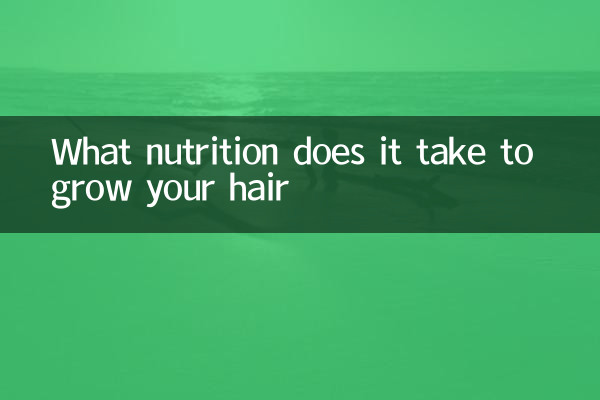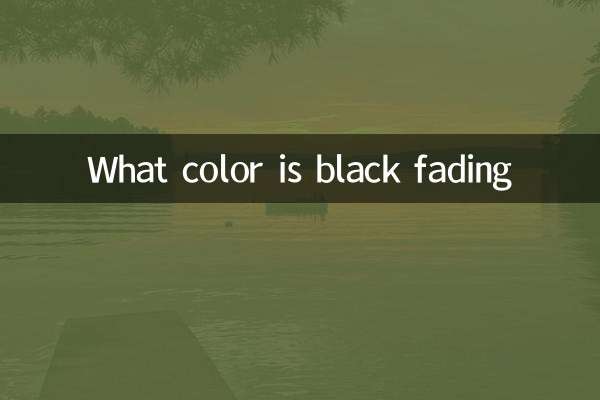What nutrition does it take to grow your hair
In modern society, hair loss and thinning hair problems plague many people. Healthy hair growth is closely related to nutritional intake, and the lack of key nutrients can lead to fragility, slow growth and even shedding of hair. This article will combine popular topics and hot content on the Internet for the past 10 days to analyze the nutrition required for hair growth in detail and provide scientific advice.
1. The relationship between hair health and nutrition

The growth cycle of hair is divided into growth phase, regression phase and rest phase. Adequate nutrition can prolong the growth phase and promote hair follicles' health. The following are hot topics of hair health discussed across the Internet:
| Hot Topics | Discussion hot topic | Key Discovery |
|---|---|---|
| "Food to prevent hair loss" | ★★★★★ | Protein and iron are the most popular |
| "Bare Vitamin" | ★★★★☆ | Vitamin B and vitamin D are discussed most |
| "Hair transplant vs. nutritional conditioning" | ★★★☆☆ | 80% of netizens give priority to nutrition improvement |
| "Traditional Chinese Medicine Hair Care Diet Therapy" | ★★★☆☆ | Traditional ingredients such as black sesame and walnut have returned to the trend |
2. Nutrients necessary for hair growth
According to nutrition and dermatologists’ recommendations, these are the important nutrients that promote healthy hair growth:
| Nutrients | Mechanism of action | Best food sources | Daily recommendations |
|---|---|---|---|
| protein | The main components of hair keratin | Eggs, fish, lean meat, beans | 0.8-1g/kg weight |
| Iron element | Promote oxygen supply to hair follicles and prevent hair loss | Red meat, spinach, animal liver | 8-18mg |
| Zinc | Regulates hair follicle cell division and repair | Oysters, nuts, whole grains | 8-11mg |
| Vitamin B7 (biotin) | Promote keratin formation and thicken hair dryness | Egg yolks, nuts, yeast | 30-100μg |
| Vitamin D | Activate dormant hair follicles to promote new growth | Sunshine, fish, fortified food | 600-800IU |
| Omega-3 fatty acids | Nourishes the scalp and reduces inflammatory hair loss | Deep sea fish, flax seeds, walnuts | 250-2000mg |
3. Precautions for nutritional supplements
1.Nutrient synergies: The effect of a single supplement is limited. Vitamin C can promote iron absorption, and vitamin E and selenium are synergistically antioxidant.
2.Risk of excess: Excessive zinc (>50mg/day) will lead to hair loss; excessive vitamin A will cause dryness and easy breakage.
3.Absorption efficiency: The absorption rate of animal iron (heme iron) is 2-3 times that of plant iron, vegetarians should pay special attention.
4.Time factor: Nutritional improvement takes 3-6 months to observe obvious results, and hair grows only 1-1.5cm per month.
4. Comparison of popular hair growth diet plans
| Dietary Plan | Core Principle | advantage | limitation |
|---|---|---|---|
| Mediterranean Diet | Rich in Omega-3 and antioxidants | Comprehensive improvements in cardiovascular and hair health | High cost of obtaining seafood |
| Plant-based diet | High fiber, low inflammation | Reduce scalp oil secretion | Pay attention to protein and iron supplements |
| Intermittent fasting | Activate cell autophagy | May promote hair follicle stem cell renewal | Not applicable for malnutrition |
| Traditional Chinese medicine black food therapy | Traditional theory of "using black to make up for black" | Easily available, gentle and safe | Lack of modern medical verification |
5. Expert suggestions and summary
1.Preferred food supplements: Unless a deficiency is diagnosed, nutrition should be obtained through a balanced diet rather than relying on supplements.
2.Personalized evaluation: Iron deficiency hair loss is more common in women, while men need to pay more attention to the effects of dihydrotestosterone (DHT).
3.Comprehensive management: Nutritional supplements need to be combined with stress reduction, regular work and rest and correct hair care habits to be effective.
4.Indications for medical treatment: If you have more than 100 hair loss per day or if you have alopecia areata, you should seek medical treatment in time rather than relying on nutritional conditioning alone.
Hair is a barometer of health. Adequate nutritional intake can not only improve hair quality, but also guarantee overall health. Remember that beautiful hair requires nourishment from the inside out, stick to a scientific diet and you will gradually gain thicker and healthier hair.

check the details

check the details